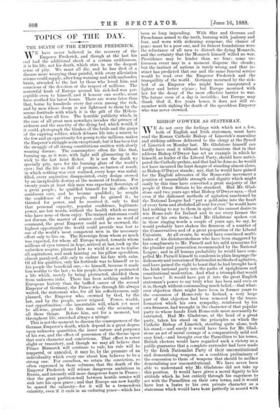TOPICS OF THE DAY.
THE DEATH OF THE EMPEROR FREDERICK.
WE have never believed in the recovery of the Emperor Frederick, and though at the last his end had the additional shock of a certain suddenness, it is his life, not his death, which stirs in us the deepest sense of pity. We must all die, and he has died of a disease more wearying than painful, with every alleviation science could supply, after long warning and with uncloudea brain, attended to the last by those who loved him, and conscious of the devotion or the respect of millions. The sorrowful hush of Europe around his sick-bed was per- ceptible even to himself, and if honour can soothe, must have soothed his latest hours. There are worse fates than that, borne by hundreds every day even among the rich, and by men whose doom is not lightened to them by the serene fortitude with which it is the gift of the Hohen- zollems to face all foes. The horrible publicity which, in the case of all great men nowadays invades the privacy of sickness and the sanctity of the dying bed, which would, if it could, photograph the blushes of the bride and the gasps of the expiring soldier, which debases life into a misery to the few and an opportunity for gossip to the millions, makes the Emperor's struggle seem exceptional; but it has been but the struggle of all strong constitutions smitten with slowly wearing disease. The consumptive often die like that, burning up, as it were, with light still glimmering in the wick to the last faint flicker. It is not the death we specially pity, save for the burning glare of the world's eyes ; but the life so full of promise, so barren of result, in which nothing was ever realised, every hope was unful- filled, every aspiration disappointed, every design crossed by an inexplicable destiny at the moment of fruition. For twenty years at least this man was expectant Sovereign of a great people ; he qualified himself for his office with assiduous care, and he became qualified ; he sought the confidence of the people, and he gained it ; he thirsted for power, and he received it, only to find that personal capacity, popular confidence, legitimate power, are but words, without the health which so many who have none of them enjoy. The trained statesman could not discuss, the master of armies could give no word of command, the great Emperor could not be crowned, the highest opportunity the world could provide was lost to one of the world's most competent men in the necessary effort only to live on. The Sovereign from whom so much was expected, for whom all Europe waited, towards whom millions of eyes turned in hope, arrived at last, took up the unbroken sceptre, planned how to wield it so as to realise all aspirations, and sank fainting on his pillow speechless, almost paralysed, able only to endure his fate with calm. Of all his qualities, only his fortitude was to himself or to his people the beneficial one,—to himself, because it made him worthy to the last ; to his people, because it protracted a life which, merely by being protracted, shielded them from unknown risks. There has been nothing sadder in European history than the baffled career of the second Emperor of Germany, the Prince who through life always waited, the statesman who, for all his reflectiveness, only planned, the Emperor who, crowned by God, by the law, and by the people, never reigned. Power, wealth, vast opportunities,—the inscrutable will, which yet must be all-wise, granted to this man only the seeming of all these things. Before him, not for a moment, but throughout life, stretched always a mirage. This is not the moment to discuss the consequences of the German Emperor's death, which depend in a great degree upon unknown quantities, the inner nature and purposes of his son, and the effect of possession of the throne upon that son's character and convictions. That effect is never slight or transitory, and though we may all believe that Prince Bismarck will continue to rule, his rule will be tempered, or annealed, it may be, by the pressure of an individuality which every one about him believes to be a strong one. For ourselves, we retain the conviction, so often expressed in these columns, that the death of the Emperor Frederick will release dangerous ambitions in Russia, and intensify still more dangerous fears in France ; that the great partition-wall between hostile armies will sink into his open grave ; and that Europe can now hardly be spared the calamity—for it will be a tremendous calamity, even if it ends in an enduring peace—which has been so long impending. With Slav and German and Frenchman armed to the teeth, burning with jealousy and fear, and worn with sickening suspense, the chance of peace must be a poor one, and its firmest foundations were the reluctance of all men to disturb the dying Monarch, and the certainty that the Monarch himself willed no war. Providence may be kinder than we fear ; some un- foreseen event may in a moment disperse the clouds ; but the instinct of nations is rarely wrong, and that in- stinct has predicted that one and the same funeral service would be read over the Emperor Frederick and the tranquillity of the world. Germany mourned by the sick- bed of an Emperor who might have inaugurated a lighter and better regime; but Europe mourned with her for the decay of the most effective barrier to war. The future even of a day is invisible ; but Europe may- thank God if, five years hence, it does not still re- member with sighing the death of the speechless Emperor who was never crowned.


































 Previous page
Previous page